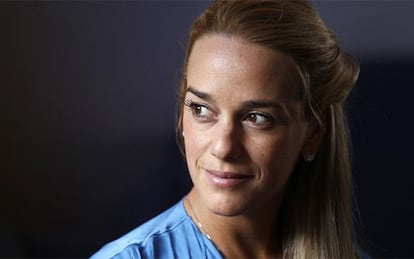“The protests will continue. The Venezuelan people are fed up”
Lilian Tintori, wife of Venezuelan opposition leader Leopoldo López, condemns his imprisonment


On February 18, Leopoldo López showed up in the middle of a demonstration against the government in Caracas knowing they were going to arrest him. Authorities were looking for him for allegedly promoting violence at the anti-government rallies that had become a part of everyday life in the Venezuelan capital. Moments before his arrest, López, the leader of opposition party Popular Will, gave a speech. He told the crowd that he was turning himself in to this “unfair” and “corrupt” justice system.
Lilian Tintori, his wife, was by his side. A photograph of López kissing her goodbye has become one of the most iconic images of the marches against President Nicolás Maduro. “When Leopoldo was going to turn himself in I said to him, ‘Don’t turn yourself in. There is no justice here. They will leave you in jail for a long time and there is no justice system to defend you’,” Tintori tells the press in Madrid. “Leopoldo replied, ‘That is why I am doing it. Because this has to change in my country.’ It was a difficult, emotionally draining moment. I said goodbye to him and I told him that he could count on me. He asked me to take care of my children and to keep up their education. To explain clearly to them why he had taken that step. And he asked me to be resilient.”
Leopoldo asked me to take care of my children and explain clearly why he had taken this step”
Three months after his arrest, López is still in prison. He has yet to see a judge. His court date was pushed back for reasons that remain unclear. “He is in solitary confinement, kidnapped,” his wife says. “They are violating his rights to due process. They are also violating his rights as a prisoner. He cannot receive unsupervised visits. He cannot receive private letters and he cannot speak to other prisoners. He has only been able to see his parents, his children and me. In three months. They are keeping him isolated in a punishment room. The way they have imprisoned innocent students and two mayors is so unfair. This has to stop.” Tintori does not know when López might be able to see a judge. “In Venezuela there is no democracy right now,” she adds.
Meanwhile, Tintori has gone from being a personality in the society pages and wife of the opposition leader to being one of the main representatives of the demonstrators. “There is a dictatorship in Venezuela right now and we are fighting to restore democracy,” she says, in chorus with other opposition leaders who do not think the country can wait for the next elections or a recall referendum. Tintori says the Maduro administration is using its resources against the opposition, rather than for fighting violence. “They use force against the youth, against mothers who are protesting on the streets. It’s very sad. They have cut us off completely. They only let us march in specific areas in the capital. And five days ago there was a student march. The security forces ambushed them. They surrounded the protestors and arrested 129 students. They took them away without an arrest warrant, court order or any other legal proceedings. Now the government has destroyed and terrorized 129 more families.”
Tintori is visiting Spain and France to rally international support for the opposition and to counter the government’s control of the media in Venezuela. “We have come here to these countries where they respect democracy to ask for help,” Tintori begins. “To ask that they do not leave us all alone. We’re going to hold on but we need support from other countries. They should protest and raise their voices to make Venezuela respect human rights.”
López decided to turn himself in after going into hiding for a week. He had heard that the government was holding him responsible for the violence. “Leopoldo made a very logical decision,” Tintori says. “He wanted to turn himself in to stand up for the Venezuelan people. And when he did it, he said, ‘If my imprisonment makes people wake up and react, it will be worth it.’ And he took that step forward. He made a huge sacrifice leaving his family because his country needed bold steps.”
We believe in dialogue when the conditions are right”
Tintori denies that López was responsible in any way for the violence that provoked his arrest. “Leopoldo was a peaceful leader, a progressive leader. He has always called for peaceful, organized and disciplined demonstrations. We have always denounced all violence. They wanted to trap Leopoldo. They wanted to say he was a fascist, a supporter of coups d’état, a terrorist. He is none of those things. He is a progressive leader who dreams of a better Venezuela. I would never have married a terrorist.”
The violent turn of the protests, which began in November 2013, reflects a schism within the Venezuelan opposition. The Democratic Unity Roundtable is on one side. Its leaders participated in the elections and once agreed to sit down with the government. Those negotiations are on hold because certain agreed points have not been implemented. López and Representative María Corina Machado are on the other side. They are betting on using street demonstrations to pressure the government and drive it out of office through constitutional means. Tintori, however, rejects any notion that there is division within the camp. “We believe in the Constitution and in dialogue when the conditions are right,” she says. One of those conditions is “respect for human rights.”
Despite past talks with the government, Venezuelan opposition leaders are not willing to let up on demonstrations. “The protests will continue. The Venezuelan people are fed up. The Venezuelan people only want to be able to buy oil to cook, toilet paper to use and diapers for their babies. They want to be able to walk or go into a quiet and safe park with their children, which we do not have today. That’s what the Venezuelan people want. We ask for improvements in security, inflation, and access to food and other goods.”
Translation: Dyane Jean François
Tu suscripción se está usando en otro dispositivo
¿Quieres añadir otro usuario a tu suscripción?
Si continúas leyendo en este dispositivo, no se podrá leer en el otro.
FlechaTu suscripción se está usando en otro dispositivo y solo puedes acceder a EL PAÍS desde un dispositivo a la vez.
Si quieres compartir tu cuenta, cambia tu suscripción a la modalidad Premium, así podrás añadir otro usuario. Cada uno accederá con su propia cuenta de email, lo que os permitirá personalizar vuestra experiencia en EL PAÍS.
¿Tienes una suscripción de empresa? Accede aquí para contratar más cuentas.
En el caso de no saber quién está usando tu cuenta, te recomendamos cambiar tu contraseña aquí.
Si decides continuar compartiendo tu cuenta, este mensaje se mostrará en tu dispositivo y en el de la otra persona que está usando tu cuenta de forma indefinida, afectando a tu experiencia de lectura. Puedes consultar aquí los términos y condiciones de la suscripción digital.








































